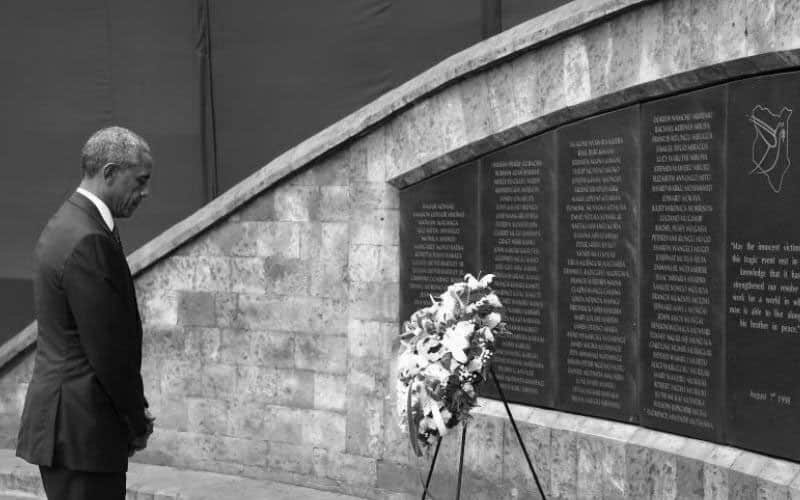20 Years On: Reflecting on the Impact and Lessons Learned from the 1998 Bombings of US Embassies in Kenya and Tanzania
In 1998, the world was shaken by the horrific bombings of the US embassies in Kenya and Tanzania. Now, two decades later, we reflect on the impact of these tragic events and the lessons we have learned. This article delves into the aftermath of the bombings, exploring the lasting effects on the affected countries and the international community as a whole.
Historical context leading up to the bombings

The 1998 bombing of us embassies in Kenya and Tanzania, were not isolated incidents. They occurred during a time of increased tensions between the United States and extremist groups, particularly Al-Qaeda. It is important to understand the historical context in order to grasp the significance of these attacks.
In the years leading up to the bombings, Al-Qaeda had been growing in strength and influence. They had carried out several attacks against US targets, including the 1993 World Trade Center bombing in New York City. These attacks showcased the group’s determination and ability to strike at the heart of American power.
Impact of the bombings on the affected countries
The u.s. embassy bombing in Kenya and Tanzania 1998 had a devastating impact on both countries. The attacks left 224 people dead and thousands more injured. The physical destruction was immense, with entire buildings reduced to rubble and countless lives shattered.
In Kenya, the bombing of the US embassy in Nairobi had a profound effect on the capital city. The blast created a deep crater and caused significant damage to neighboring buildings. The loss of life was felt throughout the country, with families losing loved ones and communities mourning their losses.
Lessons learned from the bombings
The bombings of the US embassies in Kenya and Tanzania served as a wake-up call for the international community. They highlighted the need for improved security measures and a more coordinated approach to counter-terrorism efforts.
One of the key lessons learned from these attacks was the importance of intelligence sharing and collaboration between nations. Prior to the bombings, there were intelligence reports that indicated a potential threat, but the information was not effectively communicated or acted upon. This failure underscored the need for better coordination and communication between intelligence agencies.
Changes in embassy security measures post-1998
In the aftermath of the bombings, significant changes were made to embassy security measures around the world. The attacks exposed vulnerabilities in embassy design and security protocols, prompting a thorough review of existing practices.
Embassies began implementing stricter access controls, including enhanced screening procedures for visitors and increased security personnel. Physical barriers, such as reinforced walls and blast-resistant windows, were also installed to protect against future attacks. Additionally, intelligence-sharing mechanisms were strengthened to ensure timely and effective communication of potential threats.
International response to the bombings
The us embassy bombing in kenya and tanzania 1998 sent shockwaves throughout the international community. Countries around the world expressed their solidarity with the affected nations and condemned the acts of terrorism.
The United States, in particular, vowed to pursue those responsible and bring them to justice. A joint investigation with Kenyan and Tanzanian authorities was launched, leading to the identification and capture of several individuals involved in the attacks. This collaborative effort demonstrated the importance of international cooperation in combating terrorism.
Commemorations and memorials for the victims

In the years since the bombings, numerous commemorations and memorials have been established to honor the victims and ensure their memory lives on. These memorials serve as a reminder of the human toll of terrorism and the resilience of the affected communities.
In Nairobi, the August 7th Memorial Park was created at the site of the former US embassy. It features a memorial wall engraved with the names of those who lost their lives in the attack. Similarly, in Dar es Salaam, a memorial garden was established near the location of the embassy bombing, providing a peaceful space for reflection and remembrance.
Ongoing threats and counterterrorism efforts in the region
Despite the passage of time, the threat of terrorism in the region has not diminished. Extremist groups continue to operate in East Africa, posing a significant risk to regional stability and security.
Efforts to counter these threats have been ongoing, with increased intelligence sharing, joint military operations, and capacity-building initiatives. The international community remains committed to supporting the affected countries in their fight against terrorism and extremism.
The legacy of the 1998 bombings on US foreign policy
The bombings of the US embassies in Kenya and Tanzania had a profound impact on US foreign policy. They served as a catalyst for a more aggressive approach to counter-terrorism, with the United States vowing to take decisive action against those who seek to harm its interests.
In the years following the attacks, the United States launched military operations against Al-Qaeda and its affiliates, both in the region and globally. These efforts aimed to disrupt and dismantle terrorist networks, prevent future attacks, and bring those responsible to justice.
Conclusion: Remembering the victims and the importance of preventing future attacks
As we reflect on the 20th anniversary of the bombings of the US embassies in Kenya and Tanzania, it is crucial to remember the lives lost and the resilience of the affected nations. These tragic events serve as a sobering reminder of the devastating impact of terrorism.
Through improved security measures, enhanced intelligence sharing, and international collaboration, significant progress has been made in preventing future attacks. However, the threat of terrorism persists, and the fight against extremism continues.
By honoring the victims and learning from the past, we can strive for a more peaceful and secure future. Together, we can work towards a world where such acts of violence are nothing but a distant memory.
For more articles related to Politics in Tanzania, click here!

































